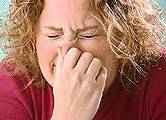- Could Your Grocery Store Meat Be Causing Recurring UTIs?
- Are You Making This Expensive Thermostat Error This Winter?
- Recognizing the Signs of Hypothyroidism
- 10 Strategies to Overcome Insomnia
- Could Artificial Sweeteners Be Aging the Brain Faster?
- Techniques for Soothing Your Nervous System
- Does the Water in Your House Smell Funny? Here’s Why
- Can a Daily Dose of Apple Cider Vinegar Actually Aid Weight Loss?
- 6 Health Beverages That Can Actually Spike Your Blood Sugar
- Treatment Options for Social Anxiety Disorder
Spring Allergies Coming Into Bloom


With winter loosening its icy grip on most of the United States, it’s time to think about spring allergies, a doctor says.
Allergies to spring pollens cause sneezing, stuffy and runny nose, and watery eyes. Other symptoms include itchy nose, mouth, throat, eyes and ears, said Dr. Luz Fonacier, head of allergy and training at Winthrop University Hospital in Mineola, N.Y.
At least three-quarters of asthma patients have allergies, “and these allergic responses in the lung can lead to coughing, wheezing and shortness of breath,” Fonacier added.
It’s important to know the things that trigger your allergies so that you can take steps to avoid them, she pointed out in a hospital news release.
Monitor pollen and mold counts, and stay inside during mid-day and afternoon hours when pollen counts are highest. Take a shower, wash your hair and change your clothes after being outdoors, she suggested.
During allergy season, keep windows and doors shut at home and use air conditioning, which dries the air. You also should keep your car windows up during allergy season, Fonacier said.
If you have severe allergy symptoms, wear a mask when doing outdoor tasks such as mowing the lawn. Consult an allergist about the best type of mask. She advises against mowing the lawn or raking leaves, if possible, because these activities stir up pollen and molds. Also, don’t hang sheets or clothes outside to dry.
Take allergy medications before symptoms begin and use them as prescribed. If you don’t already receive them, consider allergy shots, Fonacier said.
Some people move to other parts of the country in an attempt to reduce their allergy symptoms. However, many types of pollen and molds are common in most regions, so moving is probably not the answer, she explained.
More information
The U.S. National Library of Medicine has more about pollen allergy.
Source: HealthDay
Copyright © 2026 HealthDay. All rights reserved.










